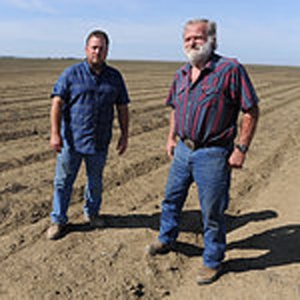|
Despair as Californian valley dries up
By Anonymous — Wednesday, March 18th, 2009
 Jim Diedrich (L) and his son Todd stand on some of their farmland which will not be planted this season due to lack of water, in Firebaugh, California. "Now we know how the Indians felt," sighs Jim Diedrich, a farmer who says he feels betrayed by government as California's Central Valley reels from a serious drought. Mr Diedrich, whose family has farmed in the western US state since 1882, bitterly surveyed their 260-hectare stretch of land. What would usually be a tomato field has now been reduced to a dusty expanse dotted with weeds. "We've got zero water this year," explained Mr Diedrich, 66, who has spent 50 years working the land. Like many other farmers in California, he had to leave idle most of his land in Firebaugh, 230 kilometres south-east of San Francisco. Gone are the 50,000 tons of tomatoes he would have sold for $US4 million ($6.1 million). The Central Valley, a vast expanse the size of Bulgaria, began as a semi-desert. But thanks to a massive irrigation network, it has become the number one source of market produce in the country: 94 per cent of US tomatoes and 89 per cent of US carrots are grown here. But hit by a third successive winter of light rainfall, the lush desert miracle has gone awry. "The storages are so low, the main population is number one, the fisheries, wetlands, are second, and the farmers third," Mr Diedrich said, explaining how the state-managed distribution system favors individuals and nature sanctuaries. The coup de grace, he said, came when a federal judge ordered water pumping cutbacks from the Sacramento River Delta in August 2007 to protect an endangered fish species. Pumping was then cut by half, which exacerbated the water shortage. Environmentalists are "very strong, well-funded, very smart, and represent a lot of votes", said Mr Diedrich's brother Bill, 54, who sits on the region's water board. When the Diedrich brothers moved to Firebaugh in the late 1960s, the state promised abundant water, they recalled. Back then, most crops were annual ones. But "as water came more scarce, we had to invest in expensive material such as a dripping system, and then permanent crops to try to pay for the water," Bill Diedrich recalled. "Now, we have this huge investment in permanent crops so we don't have the flexibility that we had back in the seventies, when you could just shut down for a year." Jim Diedrich and his son Todd now own 216 hectares of almond trees and more than 405 hectares of now-fallow tomato fields. In order to keep that crop alive, the farmers have to buy water at a high price: $US400 per acre foot (1,200 cubic metres), for an estimated annual bill of $US750,000. "All assets we have we use to get by this year, and heaven forbid, we don't know what we're going to do next year" if water remains scarce, said Bill Diedrich. According to a recent university study, 70,000 jobs are threatened by drought in the valley, where unemployment has already topped 20 per cent in some areas. "Now we know how the Indians felt" when colonisers stripped them of their land and their rights, Jim Diedrich said. "We've got the same treatment, he said. Now fallow, some fields in Firebaugh have already returned to their natural state - grassland for sheep. "Some say that this should never have been farmland. But in that case, Los Angeles should never have been Los Angeles!" said Bob Diedrich, 57. But "Los Angeles was a desert also," he recalled. |
